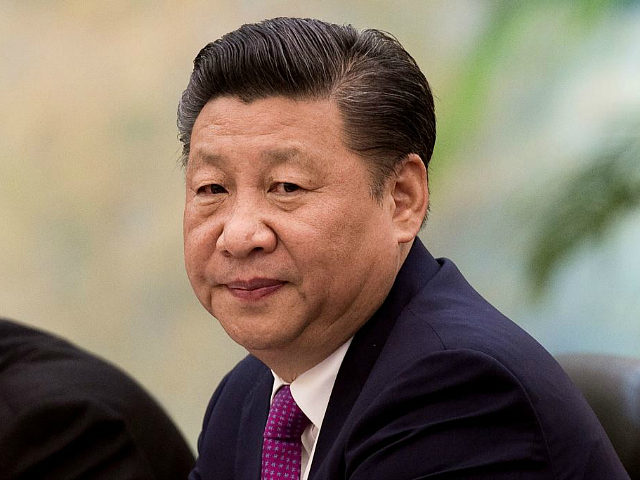Chinese Communist Party leader Xi Jinping offered a rousing defense of globalism and suggested “the evolution of global governance system will have a profound impact on the development of all countries” during Wednesday’s opening of the BRICS summit in South Africa.
BRICS is a global trade and diplomatic bloc consisting of Brazil, Russia, India, China, and South Africa, which meets semi-regularly for a summit on how to enhance the relationship linking the five countries, particularly regarding economic development. Xi Jinping, as the head of the healthiest economy in the group, spoke on Friday and asserted that “a global perspective” that rejects “unilateralism and protectionism,” an apparent swipe at the economic policies of American President Donald Trump.
“The next decade will see a profound reshaping of the global governance system. The world is moving toward multi-polarity and greater economic globalization amid setbacks,” Xi argued, according to Chinese state outlet Xinhua. “Geopolitical hotspots keep emerging, and the dark shadow of terrorism and armed conflicts still haunts us. Unilateralism and protectionism are mounting, dealing a severe blow to multilateralism and the multilateral trading regime.”
“The international community has reached a new crossroads,” he suggested.
At that crossroads, Xi suggested leaders should embrace “openness and cooperation,” adding “a trade war should be rejected, because there will be no winner. Economic hegemony is even more objectionable, as it will undermine the collective interests of the international community; those who pursue this course will only end up hurting themselves.”
He also repeatedly referred to “global governance” and asked BRICS countries to “improve” it and pressure the world to “fully observe collectively adopted international rules, and we should treat all countries as equals regardless of their size, address issues that matter to all through consultation and oppose hegemony and power politics.”
Xi’s support for global governance follows years of disregard for the Permanent Court of Arbitration at the Hague, considered the world’s most prestigious judicial body for disputes between states. The court ruled in 2016 that China’s colonization of much of the South China Sea was illegal, a ruling Beijing insisted on ignoring.
The Chinese president also made sure to promote the One Belt, One Road (OBOR) project, which requires China to have much control over the South China Sea (which it refers to as the “Maritime Silk Road”). “China will continue to vigorously pursue the Belt and Road Initiative to create new opportunities of social and economic development for participating countries and for them to implement the UN 2030 Agenda,” Xi promised. “The Belt and Road Initiative, guided by the principle of seeking shared benefits through extensive consultation and joint contribution, originated in China but belongs to the world.”
OBOR is an initiative in which China is offering predatory loans to developing countries around the world in exchange for help building major roads, ports, and railways. When countries fail to pay their loans, China picks up ownership of the new infrastructure, giving Beijing extensive control over global commerce. As its closest BRICS neighbor, India has been the least receptive country in the coalition to the OBOR project, though Russia — which China is slowly surrounding with projects in Central Asia — has also responded to the initiative with concern.
On Tuesday, before the BRICS summit officially began, Xi signed a million-dollar deal with the government of South Africa to incorporate that country further into the OBOR project. The Chinese government has particularly targeted Africa, which Xi repeatedly mentioned as a fruitful economic climate for China in his BRICS speech, for OBOR predatory loans.
Xi concluded that the BRICS countries, with China as their most potent member, have a responsibility to “steer the global economy toward greater openness, inclusiveness, balanced growth and win-win outcomes for all.
Xi was quick to use much of the language that he has repeated with frequency since his speech at the Communist Party Congress (CPC) in October, insisting on “win-win cooperation” and “a community with a shared future for mankind.” The latter phrase, a key tenet of “Xi Jinping Thought on Socialism with Chinese Characteristics for a New Era,” is now officially part of the Chinese Communist Party constitution.

COMMENTS
Please let us know if you're having issues with commenting.